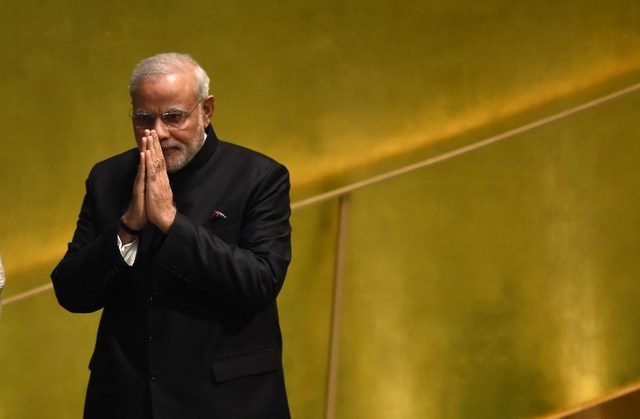SUMMARY
This is AI generated summarization, which may have errors. For context, always refer to the full article.

NEW DELHI, India (3rd UPDATE) – India, the world’s 3rd biggest carbon emitter, ratified the Paris agreement on climate change on Sunday, October 2, on the birthday of the country’s famously ascetic independence leader Mahatma Gandhi.
India, with a population of 1.3 billion people, is the latest big polluter to formally sign onto the historic accord which now takes a major step towards becoming reality.
Environment minister Anil Madhav Dave said “India deposited its Instrument of Ratification of the Paris Agreement on Climate Change” at the United Nations in New York.
“Great push to global actions to address climate change,” he added on Twitter.
The accord, sealed last December in Paris, needs ratification from 55 countries that account for at least 55% of the planet’s greenhouse gas emissions responsible for climate change.
With India’s move, a total of 62 countries accounting for almost 52% of emissions have now ratified the agreement to commit to take action to stem the planet’s rising temperatures.
Prime Minister Narendra Modi announced last month that October 2, a national holiday, had been chosen as the ratification date because freedom fighter Gandhi had lived his life with a low-carbon footprint.
UN chief Ban Ki-moon and others have voiced confidence the accord will come into force by the end of the year, after a string of nations joined up, including the United States and China, the two largest emitters.
“India’s leadership builds on the continued strong political momentum from Paris for urgent global action on climate change,” Ban said in a statement.
“Action on climate change is crucial for achieving the Sustainable Development Goals and creating a more prosperous, equitable and livable future for all people.”
US President Barack Obama also commended India’s move, writing on Twitter that “Gandhiji believed in a world worthy of our children. In joining the Paris Agreement, @narendramodi & the Indian people carry on that legacy.”
France also welcomed India’s ratification of the agreement.
French Environment Minister Segolene Royal told AFP it would “allow the accord to come into effect in record time.”
And the Elysee Palace “hailed” Delhi’s move.
“This decision, following that of the European environment ministers, brings us close to the Paris accord coming into effect by the end of the year.”
EU environment ministers agreed last week to fast-track the ratification.
The accord requires all countries to devise plans to achieve the goal of keeping the rise of temperatures within two degrees Celsius above pre-industrial levels.
Environmentalists welcomed Sunday’s move, but urged India to work to phase out heavily-polluting coal, which it relies on heavily for electricity.
“India is one the very few large economies that has not made any promises of phasing out of coal,” said Joydeep Gupta, director of “the third pole” website which focuses on environmental issues.
“This government is good on renewable energy, but not good on environmental issues. There is a lot of pushing back on air pollution, water pollution, soil pollution,” he told AFP.
India, the world’s fastest growing major economy, has long insisted that it needs to keep burning cheap and plentiful coal to cut crippling blackouts and bring electricity to millions of poor living without it.
India, which accounts for 4.1% t of global emissions and is the 3rd largest carbon-emitting country, has not agreed to cap or cut its emissions outright like some.
Instead, it says it will hike up its use of green energy and reduce its emissions relative to its gross domestic product by up to 35% by 2030 from 2005 levels – meaning emissions will continue to grow but at a slower rate.
Modi has set an ambitious target of reaching 100,000 megawatts of solar power by 2022, up from about 20,000 at the moment.
Modi, and other leaders of developing nations, argued in Paris that rich countries must shoulder the lion’s share of responsibility for tackling climate change as they have polluted most since the Industrial Revolution.
2015 was the hottest year on record, and 2016 is shaping up to be even warmer, US and European government scientists have forecast. – Rappler.com
Add a comment
How does this make you feel?
There are no comments yet. Add your comment to start the conversation.